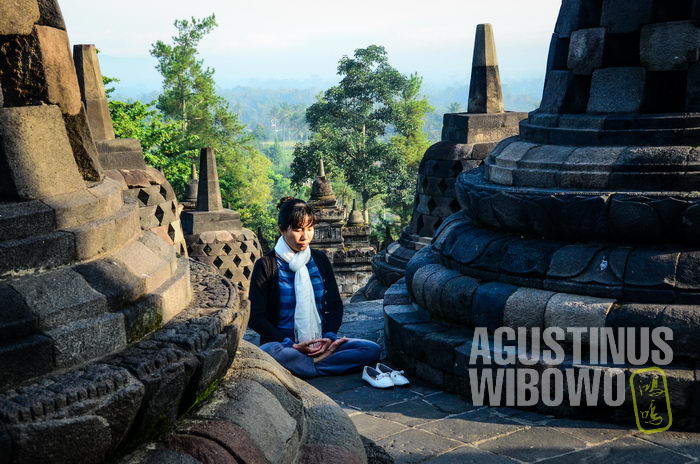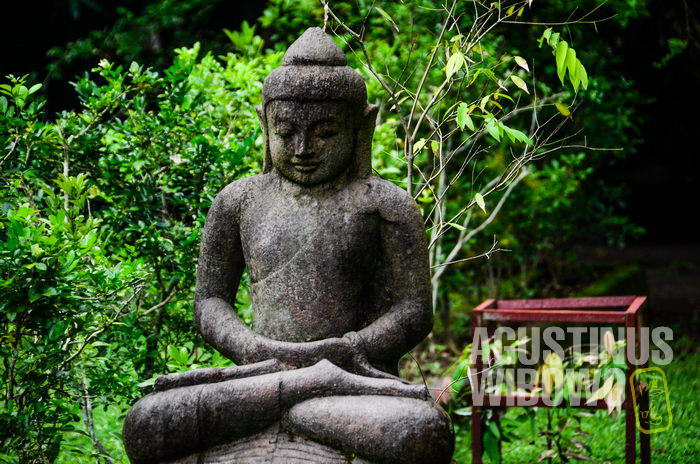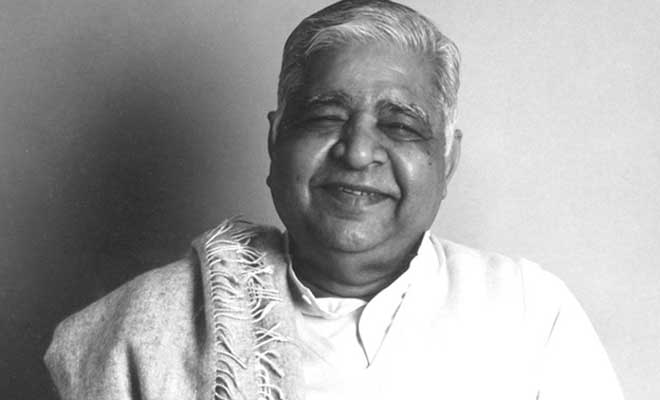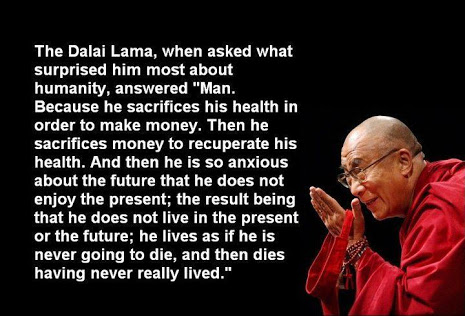My Healing with Vipassana (3): The Art of Simple Life
 The Vipassana experience was magical for me as I could now sense the sensation of the surface of my whole body, from top of the head to toe. I could sense the interior of my body. My left brain, my right brain, my stomach and my intestines, my bones… all were producing never-ending subtle vibrations. I could even sense the parts of the body when I was sleeping. When I was dreaming, it was more like watching a movie rather than being involved in the actions of the fantasy.
The Vipassana experience was magical for me as I could now sense the sensation of the surface of my whole body, from top of the head to toe. I could sense the interior of my body. My left brain, my right brain, my stomach and my intestines, my bones… all were producing never-ending subtle vibrations. I could even sense the parts of the body when I was sleeping. When I was dreaming, it was more like watching a movie rather than being involved in the actions of the fantasy.
At this point, the meditation was not merely about sitting anymore. When we take breath, we meditate. When we walk, we meditate. When we eat and drink, we meditate. Even when we sleep, as long as the awareness is there, we also meditate.
By Day 6, I started to notice small details I used to neglect. I started to see the movement of grass and leaves of the trees, appreciate the freshness of the air and the beauty of the occasional noise from the neighborhood, and be thankful to all my weaknesses and flaws, all achievements and failures, all happy and sad moments in my life. All the findings and the losses. All friends and families I still have or ever had. All conditions I like and dislike.
I also started to understand the logic behind all the restrictions of Noble Silence. The monastic life with the absent of anything but the most basic necessities gives you the simplest form of life. It proves that all the things we thought necessary to bring us happiness are actually unnecessary.
The simplicity of life also teaches you to be nobody. No matter whether you are a famed celebrity or an unemployed, a dedicated Father or a successful writer, an Indonesian or an Italian, during the meditation none of your identities are important. You are the same as anybody else. You don’t even have any rights to complain or to request anything, as in this free meditation course you are totally provided by others’ mercy. You are beggar, you are nobody. You can only be grateful on anything you are given. Being nobody is the starting point towards the real happiness—a selfless happiness.
The keyword the Teacher Goenka kept repeating in the prerecorded audio was “Equanimity”, or “upekkha” in Sanskrit. It means a balanced mind, which is free of craving or aversion, which is not wanting something pleasant to continue and not wanting something unpleasant to cease.
When mind is equanimous towards all sensations, pleasant or unpleasant, meditation will bring moments of happiness. This is because, when desires turn to craving and dislikes turn to aversion, we stop accepting the reality as it is in this moment. Thus, we don’t live in present moment anymore; we moved from present moment to an illusion created by the mind of what should be. When we no longer live in present moment, it’s the beginning of our suffering.
Vipassana is a non-sectarian technique of meditation; it’s free from all kinds of organized religions. The Buddha—of whom this meditation technique originated—never created religions, and always refused to talk about God. But nevertheless, the experience brought me to ‘moments of God’.
I was raised religiously and I used to live in many different countries, where I learned the spiritual wisdoms from various religions. The experience of crossing the borders of religions made me came to a conclusion that God was far beyond religions. God has no religion. God has no identity. God even has no name. God can be anything, in any names, in any forms, anywhere. But understanding God and experiencing God are two different things. To worship God is also different from realizing that you don’t need to search for God anywhere else, as God is just there inside you.
Not only Eastern religions like Hinduism and Buddhism, all other religions also actually emphasize the importance of meditation. The silent moments and the rosary prayers in Christianity are practically meditation. The shalat (namaz) prayers in Islam, the dzikr calling the various names of God, the private moments to talk to God, are also meditation. All forms of prayers are for us to learn the Compassion of God, to be submissive to God, to open up an inner journey to find God right inside our heart. But as the prayers often became routine rituals, many people have lost the point of the rituals altogether. Many people perform religious rituals without their mind and heart in their actions. Religions are for us to be closer to God, but in reality we see many people call themselves religious however their attitudes are far from the characters of God—instead of filled by boundless Compassion they were possessed by angers and hatreds and desires. Being religious does not always mean being spiritual. And vice versa.

By the ecstatic spiritual experience of Day 6, I thought I already grabbed the wisdom of meditation. Until the next day. When all the magic disappeared.
Gone the subtle sensations all over my body. Gone the ecstasy of fluidity of the physical body. Gone the moments of God. What I felt now was only pain here and numb there, and most parts of my body did not even produce any sensation at all.
After we learned the technique of Vipassana, we were asked to perform aditthana, “Resolute Determination”, three times a day, by sitting in perfect meditation and not making any movement for the whole hour. Sounds hard, but in fact at the beginning I found it was not difficult at all. I enjoyed every moment of rediscovering myself and the inner journey to the heart.
But after some days, the enjoyment evaporated. Even though I could maintain the perfect aditthana position, the meditation has turned to torture. My mind kept craving for the end of the one-hour session, waiting for the exploding sound of Goenka shouting the word “Anicca!” (“Impermanent!”) followed by five minutes of chanting before the end of the session. My mind kept counting how many journeys my mental scanning I have done to my body, from head to toe and from to toe to head. My mind kept estimating, how many minutes have passed and how many more minutes I have to endure. And why this pain on my knees is so persistent? I know that at all pains are anicca, impermanent, but I was sure this pain is permanent.
Despite all the discomfort, I managed to sit still, just like a statue. But then I realized that I had the motivation wrong at the beginning.
The meditation servers probably had provided me with the best position in the meditation hall. I was seated on the second row. In the first row in front of me were the male ‘old students’—those who previously have passed at least one Vipassana course. It seemed that they always sat in such perfect idleness, with the highest level of endurance of any pains in meditation. While both ‘new students’ on my left and right were Indonesians who performed the whole meditation sessions since Day 1 in such religious manner—they always closed their eyes and did not make any moves for hours and hours. Even though I closed my eyes, I could sense their existence. And something inside me kept motivating me to endure, not to make any moves, to stay still… to show them that I was as good as them in meditation.
That’s the problem.
My reason of action was external. My source of happiness and unhappiness were also always external. I was waiting for others’ praise and recognition. At the same time, I was worrying about others’ perception on me. I had the feeling that everybody was paying attention to me, and thus I need to behave in a manner to satisfy the requirement of the crowds.
My mind was searching for root. I was raised in a Chinese Indonesian family, and since I was kid my parents emphasized on studying hard so that we could survive in the country as minority. I used to get the first or at least the second rank of the best students in school. I was obsessed by that, as when once I got the third rank, I was depressed. Later I went to China, I studied in one of the best universities there, where competition between students were even more severe. Everybody were struggling to get the best marks. It seems that competition is in Chinese blood, we compete for anything—school marks, salary, position, number of countries one visit, the size of house, the luxury of house, … the craving of winning competition with others is never ending. I was raised with competition, I lived with competition, and surely it nurtured my ego.
Being an author did not help either. It boosted my ego even worse. There were some phase in my life that I managed to calm down my ego. That was the years when I live on the road traveling overland from country to country, when I became nobody and lived under US$2 budget per day. Despite the hardship of the travel, it was actually the happiest years of mine. But then, being a best-selling author in Indonesia, at the contrary, did not bring happiness to me. There were more things I worried, there were more fears of making mistakes and failures, there were more frustration on living up to people’s expectation, there were the craving of praises and comments, there were the loneliness and torture of living not by being myself,… The negativity kept piling up, becoming a volcano of depression, just waiting for time to explode.
The meditation brought me to understanding, to the root of this suffering. Craving. All I did was actually craving for attention and recognition.

“Be equainimous. Be perfectly equainimous,” repeated Goenka through the broadcast.
Finding the core of your suffering is already a big step in solving it. I have seen that my ego has consumed me. The ego was like making a golden idol of myself, putting it in my temple of mind, and worshipping myself to the illusion that I was the perfect idol. The torture continued when I wanted to plant this idol to others’ minds, and it got even worse when I attempted to live according to others’ expectations so that my illusive idol would keep glowing in other people’s minds. What a meaningless life.
“Work diligently, diligently diligently,” the deep voice of Goenka kept repeating, “You are bound to be successful, to be successful, to be successful.”
I tried to work hard to understand the ego. Is that the same ego, which makes us loving God just for His promise of Heaven? Is that the same ego, which makes us loving someone with expectation that he or she to love us back at least with the same amount? Is that the same ego, which makes us always wanting something in return for anything we have given to others?
The ego is always nurtured by the craving and aversion. But how important is ego?
“Anicca!” suddenly the shout of Goenka shocked me, like waking me up from my wandering mind, signing that we are five minutes away from the end of our meditation session. Anicca. “Impermanent!”
Everything is impermanent. Why put so much attention to these impermanent ego? The real happiness is when the ego dissolves, and Compassion—the characteristic of God—is the way towards it. Happy people are those who don’t think too much about himself, but putting more attention to others, give to others who need, being selfless. Self-less.
I asked the teacher in the meditation hall to move me to back, where I did not need to nurture sense of competing with anybody. The teacher was reluctant to, but I insisted that my ego needed to be tamed first.
So I sat alone behind the rows of other meditators. With nobody to compete with, with no reasons but internal, I restarted my meditation. It was much harder to maintain aditthana. My mind was even restless, the sensations were even grosser. I knew my ego was revolting. And the first time in these eight days in this meditation center, I heard the mosquitoes. I sensed the mosquitoes.
Two mosquitoes, simultaneously, were sucking my blood from left and right cheeks.
My hands were almost moved to slap them. I struggled very hard not to.
“Work diligently, diligently diligently,” the deep voice of Goenka kept repeating, “You are bound to be successful, to be successful, to be successful.”
(The End.)

Disclaimer: This is my personal experience of taking Vipassana meditation. Meditation is personal, and everybody’s experience should be different. Please don’t take my experience as guide or reference when you take your own meditation. If you are interested to start your Vipassana meditation, you may check dhamma.org for worldwide free 10-day courses. Enjoy the journey and be happy!
See Also:
My Healing with Vipassana (1): A Happiness Seeker and His Breath






i have been waiting for this sequel 🙂
wah, ini artikel terakhir? lalu bagaimana, depresi teratasi setelah kursus meditasi?
Yuliani Liputo: Meditasi adalah proses berkelanjutan. Kelas Vipassana itu memberikan teknik dasar, dan harus dipraktikkan dalam kehidupan sehari-hari. Sekarang saya merasa jauh lebih baik, dan akan berusaha untuk terus lebih baik 🙂
Anicca, kata ini yang sekarang menjadi stopper bagi pikiran saya. Ketika saya beraktifitas ataupun berdiam diri, pikiran terus bekerja, ketika pikiran ini sudah menghayal yang tidak-tidak yang berpotensi membuat diri jadi sengsara saya langsung mengatakan anicca di dalam hati dilanjutkan melakukan anapana. Saya menilai hal ini sangat bermanfaat, selain membuat kita terhindar dari kesengsaraan hal ini juga bisa membuat saya menjadi lebih fokus terhadap realita saat ini.
Gak usah kursus Uni Yuliani Liputo
Aku pernah mengalami dan menjalani. Psikosomatis berat.
Ke psikiatri yg concern mengajari self healing. Tanpa obat. Diajarkan hypnotherapi. Diajarkan sambil berdzikir.
Oleh dokter Tubagus Erwin SpKj.
Hanya dalam 3 kali pertemuan.
Kemudian disarankan dilakukan rutin di rumah. Pagi 10 menit… malam menjelang tidur 10 menit…
Alhamdulillah Allah ijinkan pulih kembali.
Sekarang kalau ada masa2 galau dan gak tenang. Ya self healing sambil dzikir…..insyaAllah…
Keren. Tulisan dan kritik diri yg bagus bgt, akhirnya menemukan jg jawaban…bang Agustinus Wibowo 🙂 Jln spt itu yg diajarkan pd para penjaga adat, jg kaum Sufi.
Thx Teki. Saya nanya gitu karena di awal rangkaian tulisan agustinus ini diceritain ttg depresi yg mendorongnya ikut meditasi. Jadi ingin tahu terusannya tapi ternyata ini tulisan terakhir
Weng, glad you been through all these ‘anxiety’ and ‘idleness’. I am happy and touched by your honest brutal truth about yourself. Missed talk with you.
Thank you very much Ambar MbakyuJinem Briastuti . The meditation indeed made me more honest about myself, and more accepting. Have you ever tried meditation as well? I also missed talking with you. I hope our paths will cross again in the future.
Agustinus Wibowo I am in process looking the same ‘God(s)’ but not that intensive. I am believe if our faith cross again, it will something deeper and meaningful.
Sebelumnya entah mengapa saya terdampar di tulisan ini.
Karena baru beberapa minggu lalu ada teman juga ikutan kelas vipassana di Bogor. Nmpk pertanda supaya menguatkan tekad untuk ikutan sih 😀
Yang pasti saya banyak setuju dengan pernyataan dan pengalaman tentang konsep Ketuhanan. Terima kasih untuk tulisannya 🙂
Just finished this part 3. 🙂
Thanks for sharing. as for me all the learning and sensation described make me more knowing about the mind and ego, also open my mind to motivate my self. Ah Craving and Aversion, I also often nurture those! 😉
May all beings be free from suffering and hatred.
Maitricittena 🙂
Terima kasih telah berbagi pengalaman hidup.
Thanks for sharing : such value in understanding Anicha … and the value of developing Insight. If you google ‘Interview with God’ you will find the very quotes you are attributing to the Dalai Lama in your concluding image. Check out the video of An interview with God on Youtube:https://www.youtube.com/watch?v=YyKyb4z1wWU Just letting you know in case you wish to be respectful and authentic to the true author of these words… Namaste and blessings 😉
Congratulation to experience Anicca/Anitya/Impermanence. Anatta/Anatman/Impersonal/Selfless.
Upekkha/Balance.
Welcome to Metta/Maitri/Compassion.
Within/Inside.
May All Being Be Happy!